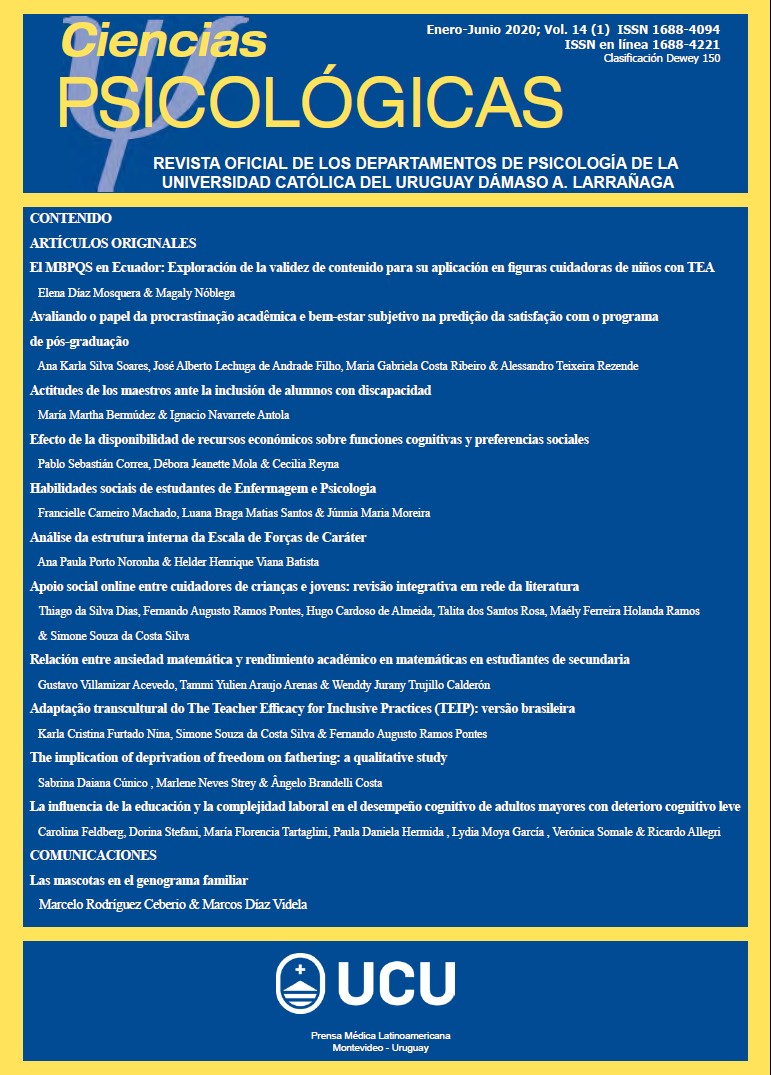Transcultural adaptation of The Teacher Efficacy for Inclusive Practices (TEIP): Brazilian versión
DOI:
https://doi.org/10.22235/cp.v14i1.2175Keywords:
autoeficácia do professor, inclusão educacional, adaptação transculturalAbstract
This study aimed achieving the cross-cultural adaptation of The Teacher's Efficacy for Inclusive Practices (TEIP) to the Brazilian context. The TEIP is an instrument composed of 18 questions categorized in three dimensions, such as: inclusive teaching strategies, effectiveness in controlling behavior and effectiveness in collaboration. Five methodological steps were carried out: translation, translation synthesis, reverse translation, committee analysis and initials testing. The target people of this initial study were composed of 15 Basic Education teachers from the mesoregion of the state of Pará-Brazil. After overall evaluations, the scale showed itself up easy to be applied, good levels of acceptance and understanding. The TEIP Brazilian version is adapted regarding semantic, idiomatic, conceptual and cultural equivalences.
Downloads
References
Bandura, A. (2006). Guide for constructing self-efficacy scales. Self-Efficacy Beliefs of Adolescents, 5, 307–337.
Beaton, D. E., Bombardier, C., Guillemin, F., & Ferraz, M. B. (2000). Guidelines for the Process of Cross-Cultural Adaptation of Self-Report Measures. Spine, 25(24), 3186–3191. https://doi.org/10.1097/00007632-200012150-00014
Borsa, J. C., Damásio, B. F., & Bandeira, D. R. (2012). Anorexia on Tumblr : A Characterization Study Studies on Anorexia. Paidéia, 22(53), 43–50. https://doi.org/10.1590/1982-43272253201314
Dias, P. C. (2017). A autoeficácia dos professores para a implementação de práticas inclusivas: contributos para uma reflexão sobre a inclusão educativa. Ensaio: Avaliação e Políticas Públicas Em Educação, 25(94), 7–25. https://doi.org/10.1590/s0104-40362017000100001
Groom, B., & Rose, R. (2005). Supporting the inclusion of pupils with social, emotional and behavioural difficulties in the primary school: the role of teaching assistants. Journal of research in special educational needs, 5(1), 20-30.
Guil Bozal, M. (2006). Escala Mixta Likert-Thurstone. Guil Bozal, Manuel, no 5, 81–96.
Guillemin, F., Bombardier, C., & Beaton, D. (1993). Cross-cultural adaptation of health-related quality of life measures: literature review and proposed guidelines. Journal of clinical epidemiology, 46(12), 1417-1432.
Giusti, E., & Befi-Lopes, D. M. (2008). Tradução e adaptação transcultural de instrumentos estrangeiros para o Português Brasileiro (PB). Pró-Fono Revista de Atualização Científica, 20(3), 207-210.
Hambleton, R. K., & Patsula, L. (1998). Adapting tests for use in multiple languages and cultures. Social indicators research, 45(1-3), 153-171.
Love, A. M. A. (2016). Development of a Self-Efficacy Scale for Teachers Who Teach Kids With Autism Spectrum Disorder (pp. 1–64). https://doi.org/10.13023/ETD.2016.082
Malinen, O. P., Savolainen, H., & Xu, J. (2012). Beijing in-service teachers' self-efficacy and attitudes towards inclusive education. Teaching and Teacher Education, 28(4), 526-534.
Malinen, O., Savolainen, H., Engelbrecht, P., Xu, J., Nel, M., & Nel, N. (2013). Exploring teacher self-efficacy for inclusive practices in three diverse countries. Teaching and Teacher Education Journal, 33, 34–44. https://doi.org/http://dx.doi.org/10.1016/j.tate.2013.02.004
Matos, I. D. (2013). Teoria dos grafos no ensino básico e secundário. Universidade de Aveiro. Recuperado de https://owl. english. purdue. edu/owl/resource/560/09.
Mattos, P., Segenreich, D., Saboya, E., Louzã, M., Dias, G., & Romano, M. (2006). Transcultural adaptation of the Adult Self-Report Scale into Portuguese for evaluation of adult attention-deficit/hyperactivity disorder (ADHD). Rev Psiq Clín, 33(4), 188-94.
Nicolino, Victor; Zanotto, M. (2010). Revisao historica de pesquisas em analise do comportamento e educacao especial/inclusao publicadas no jaba entre 2001 e 2008. Psicologia: Teoria E Pratica., 12(2), 51–79.
Nougaret, A. A., Scruggs, T. E., & Mastropieri, M. A. (2005). Does teacher education produce better special education teachers?. Exceptional Children, 71(3), 217-229.
Nina, K. C., Ramos, E. M., Ramos, M. F. H., Silva, S. S., Fernandez, A. P., & Pontes, F. A. R. (2016). Sources of Self-Efficacy in Teachers Fuentes de autoeficacia en profesores. Revista de Psicología, 25(1), 1–20.
Palmer, D. (2006). Durability of changes in self‐efficacy of preservice primary teachers. International Journal of science education, 28(6), 655-671.
Sharma, U., Forlin, C., & Loreman, T. (2008). Impact of training on pre-service teachers’ attitudes and concerns about inclusive education and sentiments about persons with disabilities. Disability and Society, 23(7), 773–785. https://doi.org/10.1080/09687590802469271
Sharma, U., Loreman, T., & Forlin, C. (2012). Measuring teacher efficacy to implement inclusive practices. Journal of Research in Special Educational Needs, 12(1), 12–21. https://doi.org/10.1111/j.1471-3802.2011.01200.x
Sharma, U., Shaukat, S., & Furlonger, B. (2015). Attitudes and self‐efficacy of pre‐service teachers towards inclusion in P akistan. Journal of Research in Special Educational Needs, 15(2), 97-105.
Song, J. (2016). Inclusive Education in Japan and Korea – Japanese and Korean Teachers’ Self-Efficacy and Attitudes Towards Inclusive Education. Journal of Research in Special Educational Needs, 16, 643–648. https://doi.org/10.1111/1471-3802.12324
Tschannen-Moran, M., & Hoy, A. W. (2001). Teacher efficacy: Capturing an elusive construct. Teaching and teacher education, 17(7), 783-805.
Tschannen-Moran, M., & Gareis, C. R. (2004). Principals’ sense of efficacy: Assessing a promising construct. Journal of Educational Administration, 42(5), 573–585. https://doi.org/10.1108/09578230410554070
Winter, E. C. (2006). Preparing new teachers for inclusive schools and classrooms. Support for learning, 21(2), 85-91.
















